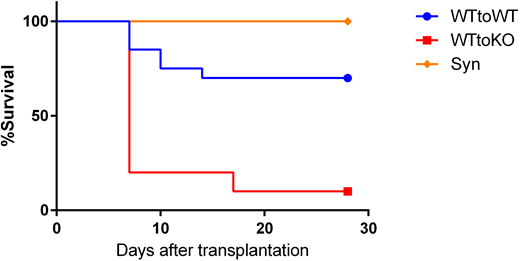Abstract
Semaphorins, originally identified as repulsive axon-guidance factors that participate in neuronal development. Several semaphorins are involved in various phases of immune responses, as has been shown recently. Semaphorin4A (Sema4A), a class IV transmembrane semaphorin, is preferentially expressed in dendritic cells (DCs) and Th1 cells. Previous studies suggested that Sema4A is involved in Ag-specific T cell priming, and in Th1 cell and Th17 cell differentiation. Additionally, Sema4A is required for the stability and function of Tregs. However, the role of Sema4A in alloimmune responses remains to be elucidated. In this study, we examined the contribution of Sema4A to T cell immune responses in the context of allogeneic hematopoietic stem cell transplantation (allo-HCT).
To test the role of Sema4A in T cell proliferation, we performed in vitro T cell proliferation assay using dendritic cells harvested from wild-type or Sema4A-KO mice. Conventional CD4+T cells cocultured with DCs harvested from wild-type and Sema4A-KO mice proliferated equally in the presence of anti-CD3 antibody. In contrast, anti-CD3-induced proliferation of Tregs cocultured with DCs harvested from Sema4A-KO mice was attenuated compared to Tregs cocultured with DCs harvested from wild-type mice, suggesting that Sema4A is required for maximum proliferation of Tregs.
We next investigated the effects of Sema4A deficiency in acute GVHD. We employed a murine acute GVHD model (B6→BALB/c) and monitored every day for survival. Body weight was assessed 2-3 times per week. First, to investigate the role of host Sema4A, lethally irradiated wild-type and Sema4A-KO mice were injected with T cell-depleted bone marrow cells and T cells isolated from wild-type B6. Sema4A-KO host mice developed significantly higher mortality compared to wild-type host mice (p<0.001) (Figure). On day 7 after allo-HCT, the proportion of Tregs in the spleen were significantly decreased in Sema4A-KO host mice compared to wild-type host mice (p<0.05). Both donor-derived preexisting natural Tregs and inducible Tregs in Sema4A-KO host mice were significantly decreased compared to wild-type host mice, although relatively less in inducible Tregs. We investigated the production of proinflammatory cytokines (IFN-g, IL-17, IL-4 and IL-13) of T cells in the spleen by intracellular cytokine staining. The proportion of IL-17+CD4+ T cells in Sema4A-KO host was slightly but not significantly decreased compared to wild-type host, whereas similar proportion of IFN-g+CD4+T cells was observed in Sema4A-KO and wild-type host mice. In contrast, the proportion of IL-4+CD4+ T cells in Sema4A-KO host was significantly increased in Sema4A-KO host mice compared to wild-type host mice, suggesting Sema4A deficiency skewed cytokine polarization of T cells after allo-HCT.
Subsequently, we used Sema4A-KO and wild-type B6 mice donor to investigate the role of donor-derived Sema4A. Host mice transplanted from Sema4A-KO donor developed comparable mortality with host mice transplanted with wild-type donor, suggesting that donor-derived Sema4A does not play an important role in controlling graft versus host reactions in this model.
Together, these results suggest that Sema4A contributes to Treg maintenance and the regulation of T cell responses after allo-HCT, which may have clinical implications for the novel approach in the treatment and protection of GVHD.
Ito:Bristol-Myers Squibb: Honoraria, Research Funding; Takeda: Honoraria; Novartis Pharma: Honoraria; Pfizer: Honoraria; Mundipharma: Honoraria; Celgene: Honoraria.
Author notes
Asterisk with author names denotes non-ASH members.


This feature is available to Subscribers Only
Sign In or Create an Account Close Modal